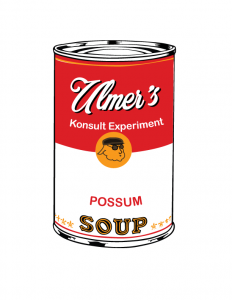
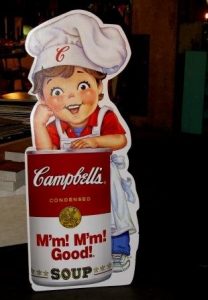 LOGO — The KE logo is a condensed metaphor, an emblem, whose attributes are worth itemizing, since they express some qualities of our program. The first is emblem design itself, which is one of the devices of konsult authoring. The first allusion is to the famous Campbell Soup Co. advertising campaign, introduced in 1934, the jingle M’m! M’m! Good! (also written mmm mmm good!). We appropriate this line to name a discipline complex counterpoint and complementary to STEM disciplines: H’MMM disciplines. The H’MMM disciplines include Humanities + Movies Media Music (and by extension, all the arts and letters disciplines). Movie Media Music references the creative industries, entertainment media, representing a multi-billion dollar industry, supporting millions of jobs. It is necessary to remark the economic power of the creative industries and the direct relationship of the skill-set upon which they rely to the H’MMM disciplines, in a context in which education policy seems only to favor and support STEM fields. The creative industries manifest the interdependence of imagination and technology, as in the Disney Imagineers, and offer a motivation for revising Humanities education to align more closely with career preparation in the creative industries, just as STEM education aligns with careers in technology and engineering. The soup jingle evoked by MMM acronym indexes the pleasure and enjoyment associated with entertainment experience. The H’ adds further meaning, pronunciation as interjection: thinking or pondering (h’mmmm); demanding an answer (h’mmm?). Most languages have some variation on this phrasing. Humanities question the satisfactions of entertainment with attitude.
LOGO — The KE logo is a condensed metaphor, an emblem, whose attributes are worth itemizing, since they express some qualities of our program. The first is emblem design itself, which is one of the devices of konsult authoring. The first allusion is to the famous Campbell Soup Co. advertising campaign, introduced in 1934, the jingle M’m! M’m! Good! (also written mmm mmm good!). We appropriate this line to name a discipline complex counterpoint and complementary to STEM disciplines: H’MMM disciplines. The H’MMM disciplines include Humanities + Movies Media Music (and by extension, all the arts and letters disciplines). Movie Media Music references the creative industries, entertainment media, representing a multi-billion dollar industry, supporting millions of jobs. It is necessary to remark the economic power of the creative industries and the direct relationship of the skill-set upon which they rely to the H’MMM disciplines, in a context in which education policy seems only to favor and support STEM fields. The creative industries manifest the interdependence of imagination and technology, as in the Disney Imagineers, and offer a motivation for revising Humanities education to align more closely with career preparation in the creative industries, just as STEM education aligns with careers in technology and engineering. The soup jingle evoked by MMM acronym indexes the pleasure and enjoyment associated with entertainment experience. The H’ adds further meaning, pronunciation as interjection: thinking or pondering (h’mmmm); demanding an answer (h’mmm?). Most languages have some variation on this phrasing. Humanities question the satisfactions of entertainment with attitude.
__________
Logo designed by Brian Gaines, Clemson University
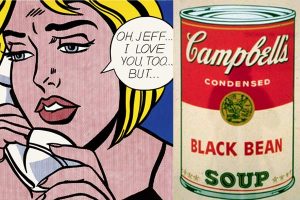 Pop Art. One of Andy Warhol’s most famous silkscreened appropriations of imagery from popular culture is the series of Campbell’s Soup cans. Warhol is demonstrating the image-authoring discourse native to electracy. Avant-garde artists in the cabaret scene of Montmartre (bohemian Paris), invented the rhetoric of collage-montage, responding in part to the new imaging technologies introduced throughout the nineteenth century. The cabaret scene, culminating in the Cabaret Voltaire in wartime Zurich, associated with the creation of Dadaism, is to electracy what the Athenian Academy is to literacy: that part of the apparatus responsible for inventing the operating metaphysics adequate to the emerging civilization. The invention was codified and perfected in the Readymades of Marcel Duchamp. Pop Art continues this invention series, providing an archive of techniques by which citizens may become authors, transforming from consumers of popular culture to electrate designers. Electrate education matches vanguard rhetorical inventions with mobile ubiquitous technologies (iPhones et al).
Pop Art. One of Andy Warhol’s most famous silkscreened appropriations of imagery from popular culture is the series of Campbell’s Soup cans. Warhol is demonstrating the image-authoring discourse native to electracy. Avant-garde artists in the cabaret scene of Montmartre (bohemian Paris), invented the rhetoric of collage-montage, responding in part to the new imaging technologies introduced throughout the nineteenth century. The cabaret scene, culminating in the Cabaret Voltaire in wartime Zurich, associated with the creation of Dadaism, is to electracy what the Athenian Academy is to literacy: that part of the apparatus responsible for inventing the operating metaphysics adequate to the emerging civilization. The invention was codified and perfected in the Readymades of Marcel Duchamp. Pop Art continues this invention series, providing an archive of techniques by which citizens may become authors, transforming from consumers of popular culture to electrate designers. Electrate education matches vanguard rhetorical inventions with mobile ubiquitous technologies (iPhones et al).
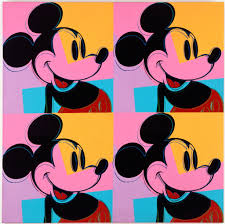
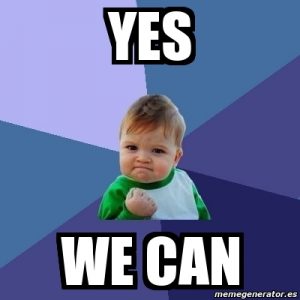
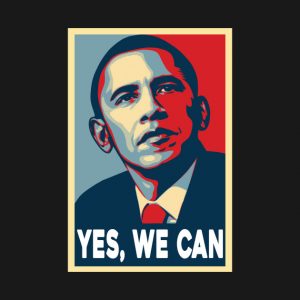

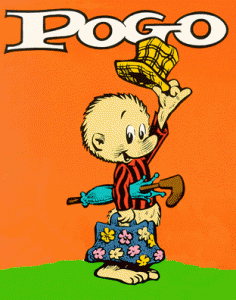 REBUS. How much can be expressed in a can? Our logo condenses Campbell’s jingle denoting the goodness (pleasure) of our disciplines, advocating image authoring following the instructions of cut-and-paste Pop Art. Now we add associations with the meme and saying–to kick the CAN down the road. This CAN gathers the modality of electracy–capability, to be able–just as literacy defined itself through the neutral modality of declarative propositions (true-false). The metaphysical question of capability draws upon the whole tradition of philosophy, from Aristotle to Deleuze, concerned with the relationship of dunamis (potentiality, the virtual) and energeia (actuality, realization). The question of capability is addressed in our fundamental education of theopraxesis (integration of the intellectual virtues, powers, capabilities, faculties). The apparati up to now institutionalized Knowing and Willing: knowing what to do; willing it be done. The aporia taken up in electracy is that knowing and willing are not enough. What remains is being able to perform, which turns out to require imagination, aesthetic judgment. Possum is a macaronic device, verbal and visual pun, a rebus device central to electrate rhetoric (the image of can = the “can” of “to be able”). This motif runs through my mystory: Walt Kelly’s Pogo was my father’s favorite, and we read it together on Sundays in my early childhood. The Posse Comitatus is a key element in the drama of High Noon, in the Entertainment/Mythology register of my popcycle. Electrate education takes up the mystery and enigma of Possum. Egent itself plays with Latin, becoming possum.
REBUS. How much can be expressed in a can? Our logo condenses Campbell’s jingle denoting the goodness (pleasure) of our disciplines, advocating image authoring following the instructions of cut-and-paste Pop Art. Now we add associations with the meme and saying–to kick the CAN down the road. This CAN gathers the modality of electracy–capability, to be able–just as literacy defined itself through the neutral modality of declarative propositions (true-false). The metaphysical question of capability draws upon the whole tradition of philosophy, from Aristotle to Deleuze, concerned with the relationship of dunamis (potentiality, the virtual) and energeia (actuality, realization). The question of capability is addressed in our fundamental education of theopraxesis (integration of the intellectual virtues, powers, capabilities, faculties). The apparati up to now institutionalized Knowing and Willing: knowing what to do; willing it be done. The aporia taken up in electracy is that knowing and willing are not enough. What remains is being able to perform, which turns out to require imagination, aesthetic judgment. Possum is a macaronic device, verbal and visual pun, a rebus device central to electrate rhetoric (the image of can = the “can” of “to be able”). This motif runs through my mystory: Walt Kelly’s Pogo was my father’s favorite, and we read it together on Sundays in my early childhood. The Posse Comitatus is a key element in the drama of High Noon, in the Entertainment/Mythology register of my popcycle. Electrate education takes up the mystery and enigma of Possum. Egent itself plays with Latin, becoming possum.
Konsult is to electracy what dialogue is to literacy
—Greg Ulmer
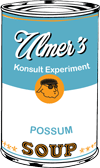

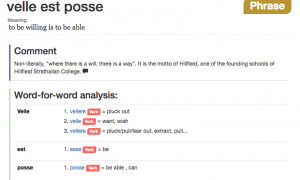 The Latin verb possum is common in many Latin texts. However, its irregular forms often give students trouble. Learn how to recognize and translate the forms of the Latin verb possum.
The Latin verb possum is common in many Latin texts. However, its irregular forms often give students trouble. Learn how to recognize and translate the forms of the Latin verb possum.